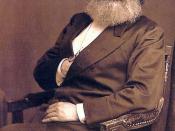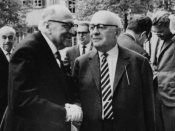Marxism is a revolutionary movement aiming at creating a world of equal social classes, in which the Bourgeoisie and Proletariat are equally sharing the means of production and property. Karl Marx's theory is purely socio-economic, however Marx and his friend Engels wrote some personal observations and comments on contemporary and ancient literature, sporadically through their socio-economic books and articles or their letters.
Literature, in all its forms, to Marx, is part of the superstructure that is formed by the Base. Literature, along with the other conventions and institutions in the Superstructure, express and promote the ideology of the Base. The Ideology preserves and works on maintaining the Status Quo of the Base. Literature then is a mirror of the society, promoting the ideology of the Base and is not involved or used to change this social reality. However, later Marxist critics viewed literature as being a major dynamic tool used by both classes to express and stimulate their beliefs.
Engels believe that a work of art should mirror the society, regardless of the picture it portrays, whether with or against the beliefs of the author. In a letter to the author of Die Alten und die Neuen (The old ones and the new), Minna Kautsky, he little expressed appreciation of the literary value of the novel; however he emphasized on the content of the novel:
You obviously felt a desire to take a public stand in your book, to testify to your convictions before the entire world. This has now been done; it is a stage you have passed through and need not repeat in this form. I am by no means opposed to partisan poetry as such. Both Aeschylus, the father of tragedy, and Aristophanes, the father of comedy, were highly partisan poets...I think however that the purpose must...


